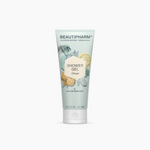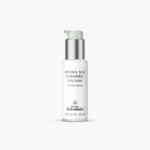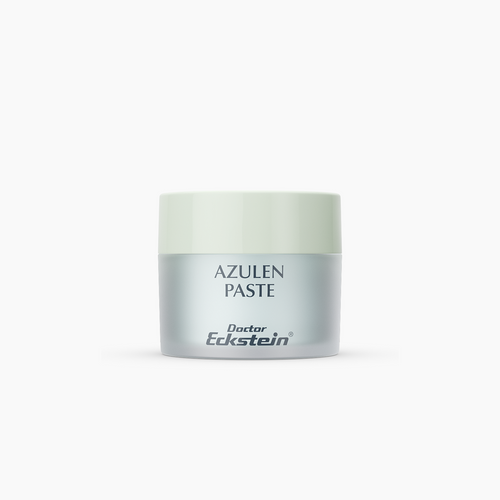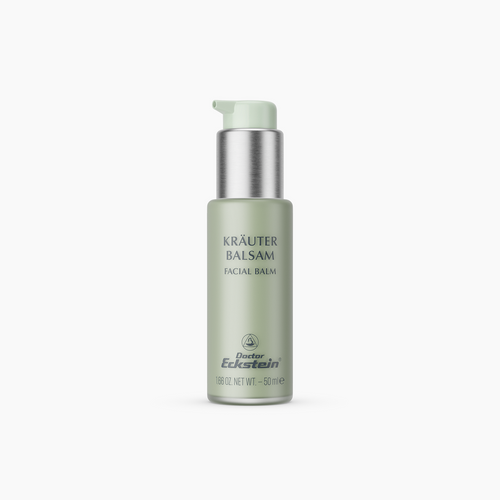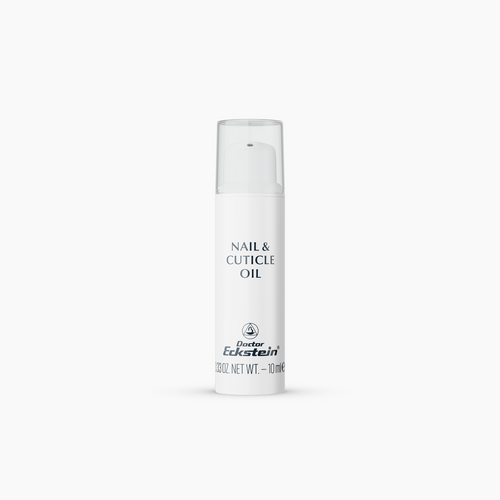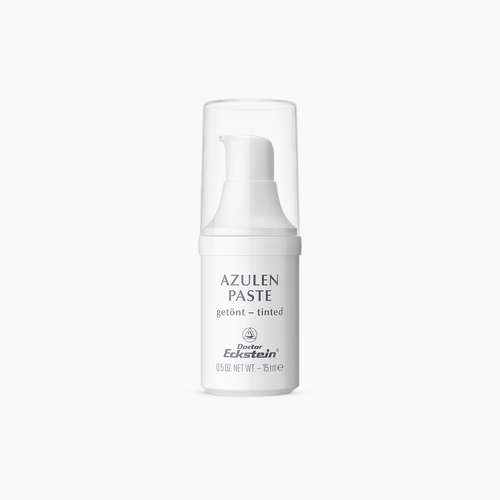There is no magical ingredient and no standard solution that works for everyone when it comes to caring for blemished skin. My grandfather Dr. R.A. Eckstein devoted several chapters of his book "BioCosmetics - from Research and Practice" to this topic. What he explained there, at the end of the 1960s, is on everyone's lips today, over sixty years later: a holistic view of people when it comes to their health and well-being. He, for example, found that cosmetic and aesthetically disruptive skin symptoms can often be attributed to psychological causes and that the connection between psychological and physical aspects therefore plays an important role in skin care.
Not that you misunderstand me: Just because there is no cosmetic cure-all, there are active ingredients that can really help the skin to alleviate impurities and to let them fade away faster. So always support the skin with the right care, especially when it is out of its natural balance. Which is the case of skin prone to blemishes. At the same time, it’s good to be self-critical and think about what are points in our lifestyle that we can change in order to additionally de-stress the skin. Because in addition to psychological factors, many other factors have been identified that influence skin health.
Treat blemished skin well - but how?
Some behaviors are easy to change, some require more discipline. I would like to support you with 10 personal lifestyle and care tips to get your stubborn skin under control. "Personal" because I speak from experience, since my skin is also prone to blemishes.
- Don’t over cleanse. Don't go overboard with your skin care routine and inquire exactly what the skin needs when you're struggling with blemishes. Create a daily care routine that makes your skin feel good and use this routine really consistently. The information that you will find here, on the website of our family business, can provide you with a good jump start Clear Balance.
- Be gentle- handle your skin carefully. Removing and extracting blemishes ourselves requires a lot of sensitivity and specialist knowledge, because there is always the risk of damaging the skin and promoting scarring. In other words, there is a lot we can do wrong. It is therefore better to go to a dermatologist or a trusted cosmetic professional who specializes in blemishes. Here skin is professionally cleansed without the risk of damaging it. A professional treatment also makes skin appear visibly clearer. A regular visit to the professional not only helps our skin, but also our self-confidence.
- Don’t touch your face. We all do it unconsciously, for example when we support our head - we touch our face with our hands and fingers. When I was in puberty, my mother never got tired of saying to me again and again: "Hands don't belong on the face". And for a good reason. If we constantly touch impure skin areas, they are unnecessarily irritated. This makes it difficult for skin to heal. In addition, fingers carry bacteria, which - especially with blemishes - have great inflammatory potential. Not to mention pathogens, which reach the mucous membranes of the eyes, nose and mouth via your hands and can therefore very easily gain access to the body.
- You have to hit the sweet spot with exfoliation. In principle, exfoliation is a good thing - even with impure skin. Exfoliation is said to support the natural process of skin renewal and to remove dead skin cells, so that the skin looks purer and more radiant. In the case of blemished skin, inquire primarily about enzymatic or gentle AHA peels, and avoid mechanical peels. The difference: With enzymatic & gentle AHA peels, the dead skin cells are removed chemically and therefore very gently from the skin, with mechanical peels tiny abrasive particles are contained in the peeling. A mechanical peeling works by "rubbing", which means that bacteria can spread all over the face. With blemished skin prone to irritation and inflammation, this is of course not a good idea. If your blemished skin is irritated or inflamed, or if you suffer from acute acne, you should generally refrain from exfoliating.
- Get your blood flowing. Exercise is good for the immune system and helps clear our head. Sweating also opens the skin pores. Dirt and excess sebum are removed naturally. So exercise and sweat - but please without makeup! I always take off my make-up whenever I go to my yoga class. Why? Because during exercise, the make-up mixes with sweat and can clog the pores. That is the last thing we want, especially with blemished skin.
- Get a good night’s sleep (but not too much either). Ever woken up after a short night, and think you don’t look like your normal self? Not only can we look different due to sleep deprivation, but lack of sleep can negatively affect our hormones, inflammation levels, and thus the condition of our skin. For example, some hormones that are affected by sleep deprivation are cortisol, norepinephrine and ghrelin (the hormone that signals hunger). Everyone who knows me knows how much I like to sleep. Are you one of them? If so, this lifestyle tip is a bit easier to implement.
- Say yes to adequate hydration. Drink the right thing, and drink enough. Water and tea. If you mean well with your skin, there is nothing better. In adults, the guideline for the amount of fluid that the body needs daily is 1.5 liters. For example, it recommends also the German Society for Nutrition.
- Keep an eye on your diet. Nutrition can also play a role when it comes to blemishes. For some people, foods such as sugar, alcohol and carbohydrates worsen the complexion. By avoiding these foods, you can influence your skin condition via your eating behavior. (Before starting something new, always get personalized medical or nutritional advice.)

-
Nutrition again: Say "yes" to fiber. Dietary fiber is an important part of the diet when it comes to keeping the intestines healthy. However, many people do not consume enough of it. For example, adults should consume 20 to 35 grams of it a day with food. In the western world, however, we only average 5 to 10 grams per day.
Dietary fiber is the non-digestible part of plant food that our bodies need for optimal nutrition. A distinction is made between water-soluble and water-insoluble fiber, which is contained in different proportions and in different amounts, for example in fruits, vegetables, legumes, nuts and in cereals.
Soluble fiber is transformed into a gel-like mass in the stomach and small intestine in combination with water, which is digested only slowly, which fills you up faster and more sustainably. They also have the ability to bind bile acids, toxins, fats and sterols, which the body can then excrete more easily. In this way, water-soluble fiber contributes to a balanced metabolism. They also contain important nutrients for intestinal bacteria, which ensure healthy intestinal flora, and soluble fiber also helps to lower cholesterol and sugar levels in the blood.
In contrast, insoluble fiber goes through the entire digestive system, increasing the volume of the stool, which stimulates bowel movement. This in turn helps prevent constipation and is the perfect basis for regular bowel movements (which are very important!). So toxins contained in the stool can be quickly excreted, which is also important for our skin health. Because if detoxification does not work properly via the intestine, other organs in the body that also serve to detoxify are put under greater strain. This also includes our largest organ, the skin.
- Conceal with a purpose. Use makeup or concealer? Gladly - but please with additional benefits. That means: Use products that hide blemishes, but at the same time are good for the skin. Here's a little anecdote: When I was in puberty, my father and our team developed our tinted azulen paste. My favorite product from our range at the time was our blue Azulene Paste, a useful helper when it comes to quickly clearing up blemishes. So I regularly went to bed with small blue spots on my face to tackle my pimples. Of course, this doesn't work during the day - especially since I wanted to hide my blemishes perfectly during the day. A two-in-one solution was needed and the idea of our Azulene Paste tinted was born. Today it is almost a classic in our range. We think skin care should come first, which is why we created makeup infused skin care. Whichever product you use to hide small blemishes, make sure that not only your appearance but also your skin benefits!
Wishing you happy skin,
Dr. Verena Eckstein, ND
Disclaimer: The purpose of this blog is to share interesting scientific literature and skin care tips. This blog is not intended to provide diagnosis, treatment or medical advice. Content provided on this blog is for informational purposes only. Please consult with a physician or other healthcare professional regarding any medical or health related diagnosis or treatment options. Information on this blog should not be considered as a substitute for advice from a healthcare professional. The statements made about specific products are not to diagnose, treat, cure or prevent disease.
